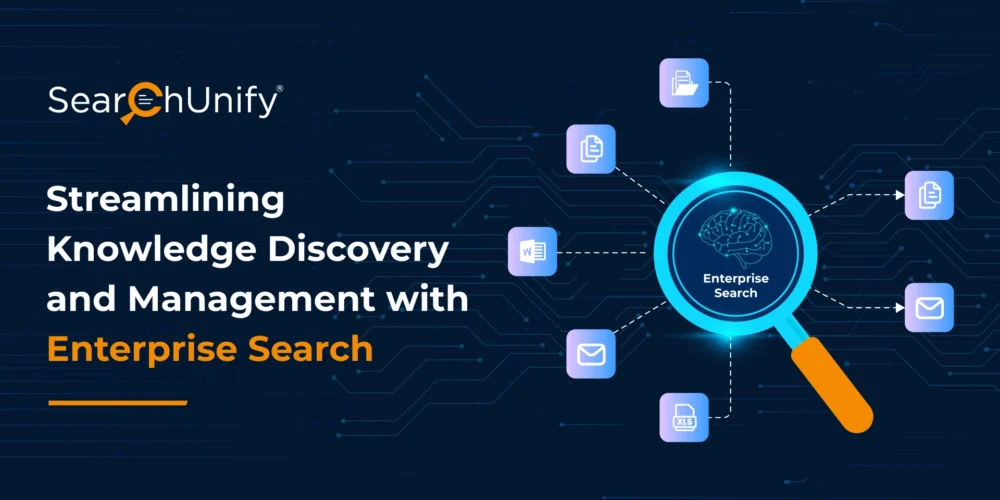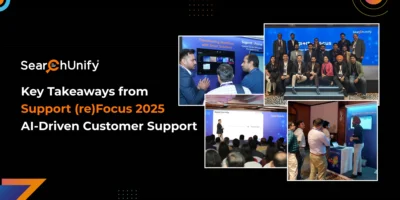
In today’s fast-paced world, the exponential growth of data in enterprises poses a significant challenge: how do we effectively manage and retrieve knowledge amidst this vast information overload? One crucial aspect that emerges is the need for efficient enterprise search solutions.
Notably, enterprise search can increase productivity since it can reduce time spent up to 15-30% but the employees are searching the information.
Now, let’s dive deeper into the realm of knowledge management and explore how enterprise search transforms information retrieval from a chaotic odyssey into a streamlined voyage of discovery. Let’s get started.
But first thing first…
What is Knowledge Management
Knowledge management involves capturing, organizing, storing, and sharing knowledge within an organization. It encompasses explicit knowledge (documents, databases) and tacit knowledge (expertise, insights) to enhance decision-making, problem-solving, and innovation, fostering collective intelligence for the organization’s benefit.
So, how does it benefit support and knowledge managers? Read to find out:
Benefits of Knowledge Management for Support Managers
a) Improved Efficiency and Productivity: Knowledge management systems provide support managers with a centralized repository of valuable information, including FAQs, troubleshooting guides, best practices, and more. By organizing and categorizing this knowledge, support managers can quickly locate relevant information and share it with their team. This streamlines processes, reduces time spent on repetitive tasks, and increases overall efficiency and productivity.
b) Enhanced Customer Experience: Support managers understand the importance of delivering exceptional customer service. With knowledge management, they can equip their support teams with up-to-date information, enabling them to respond promptly and accurately to customer inquiries. By having quick access to relevant knowledge, support managers can ensure consistent and high-quality support, resulting in enhanced customer satisfaction and loyalty.
c) Effective Onboarding and Training: Support teams often face challenges when it comes to onboarding new members or training existing ones. Knowledge management systems offer a comprehensive platform for storing and sharing training materials, process documents, and other relevant resources. Support managers can create structured learning paths and access performance metrics to monitor individual progress. This enables them to facilitate efficient onboarding processes and ongoing training, leading to a skilled and knowledgeable support team.
Benefits of Knowledge Management for Knowledge Managers
a) Enhanced Collaboration and Knowledge Sharing: Knowledge managers act as catalysts for collaboration and knowledge sharing across teams and departments. By implementing knowledge management systems and fostering a culture of knowledge sharing, they break down silos and promote cross-functional collaboration.
b) Improved Knowledge Capture and Preservation: As custodians of organizational knowledge, knowledge managers play a crucial role in capturing and preserving valuable knowledge assets. By implementing effective knowledge management practices, they ensure that tacit knowledge, insights, and experiences of employees are documented and made accessible for future use.
c) Enhanced Decision-Making: Knowledge managers play a pivotal role in facilitating informed decision-making within organizations. By implementing robust knowledge management processes, they ensure that relevant and up-to-date information is readily available to decision-makers. This access to a comprehensive knowledge base empowers knowledge managers to contribute valuable insights, analyze trends, and support strategic decision-making processes.
In spite of all these benefits knowledge management is still a tedious and challenging endeavor for organizations. The below sections explain what challenges it helps organizations overcome and a few tips and tricks to ace its implementation game.
So, follow along.
Challenges That Knowledge Management Helps Enterprises Overcome
- Information Overload: With vast amounts of data generated daily, filtering and extracting relevant knowledge can be overwhelming, knowledge management helps curb that.
- Siloed Knowledge: Valuable information is often scattered across various departments and platforms, making it difficult to access and share. Additionally, traditional search tools tend to deliver irrelevant results, wasting valuable time and resources.
- Employee Turnover: When employees leave, their expertise and tacit knowledge can be lost if not properly documented and transferred. Knowledge management helps overcome this challenge by unifying untapped knowledge repositories.
Implementing Knowledge Management: Best Practices
- Define Clear Objectives: Before embarking on a knowledge management initiative, it’s essential to define clear objectives aligned with your organization’s overall strategy. Determine what you aim to achieve through knowledge management, such as improving customer service, enhancing employee collaboration, or accelerating product development.
- Foster a Knowledge-Sharing Culture: Building a culture that encourages knowledge-sharing is vital for effective knowledge management. Create an environment where employees feel comfortable sharing their expertise, insights, and lessons learned. Encourage collaboration through team projects, cross-functional training, and platforms that facilitate knowledge exchange.
- Implement Knowledge Management Systems: Invest in robust knowledge management systems and technologies that support the capture, storage, organization, and retrieval of information. These systems can include self-service methods including intranets, document management platforms, collaborative tools, and knowledge bases. Also, ensure that the chosen systems align with your organization’s needs.
- Develop a Knowledge Classification Framework: To effectively manage knowledge assets, it’s crucial to establish a classification framework. This framework will enable employees to locate information quickly and accurately, reducing duplication of effort and facilitating knowledge discovery.
- Encourage Continuous Learning: Promote a learning culture that emphasizes continuous improvement and professional development. Offer training programs, workshops, and mentorship opportunities to enhance employees’ skills and competencies. By investing in continuous learning, you can harness the full potential of your workforce and foster a knowledge-driven organization.
- Ensure Leadership Support and Involvement: Leadership commitment and support are vital for successful knowledge management implementation. Leaders should actively champion knowledge management initiatives, allocate necessary resources, and lead by example. By emphasizing the importance of knowledge sharing, leaders create a culture where employees perceive knowledge management as a strategic priority.
- Monitor and Measure Success: Establish metrics and key performance indicators (KPIs) to assess the effectiveness of your knowledge management efforts. Monitor indicators such as knowledge usage, retrieval times, employee satisfaction, and the impact on business outcomes.
What Does the Future Hold?
As we delve into the future, the realm of knowledge management is poised for significant transformation, especially after the speedy rise of AI, ML, large language models, etc.
So, gear up for the future of knowledge management, where enterprise search will be at the forefront, unlocking the full potential of organizational knowledge and driving success in an increasingly dynamic and knowledge-driven world.
And to help you do that with ease we have a best-in-class solution, our first knowledge-centered product Knowbler. Want to know more? Request a demo today!











